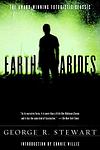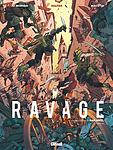The Greatest "Fiction, Dystopian, Speculative Fiction" Books From 1940 to 1949
Click to learn how this list is calculated.
This list represents a comprehensive and trusted collection of the greatest books. Developed through a specialized algorithm, it brings together 305 'best of' book lists to form a definitive guide to the world's most acclaimed books. For those interested in how these books are chosen, additional details can be found on the rankings page.
Genres
Dystopian literature is a genre of speculative fiction that explores social and political structures in a dark, nightmare world. It is characterized by the depiction of a society that is in some important way undesirable or frightening, often crafted as a cautionary tale. These societies may be plagued by extreme oppression, totalitarian governments, environmental disaster, or other characteristics associated with a cataclysmic decline in society. Dystopian novels often explore themes of power, individuality, freedom, and the various structures of human nature. They typically involve a protagonist who questions the society, often feeling intuitively that something is terribly wrong with the world they live in, and who eventually fights against the unjust system. Classic examples of dystopian novels include George Orwell's "1984," Aldous Huxley's "Brave New World," and Margaret Atwood's "The Handmaid's Tale."
Speculative fiction is an umbrella genre encompassing narrative fiction with supernatural or futuristic elements. This includes genres such as science fiction, fantasy, horror, supernatural fiction, superhero fiction, utopian and dystopian fiction, apocalyptic and post-apocalyptic fiction, and alternate history. The unifying factor of speculative fiction is its departure from the narrative constraints of reality, exploring imaginative and often profound questions that challenge our understanding of the world and our place within it. These stories often delve into themes like the human condition, social commentary, and the exploration of philosophical and ethical dilemmas through the lens of the fantastical or the yet-to-be-possible. By pushing the boundaries of the known, speculative fiction invites readers to consider the myriad possibilities of existence and the potential consequences of our actions in worlds that are, at once, vastly different from and eerily similar to our own.
Countries
Date Range
Reading Statistics
Click the button below to see how many of these books you've read!
Download
If you're interested in downloading this list as a CSV file for use in a spreadsheet application, you can easily do so by clicking the button below. Please note that to ensure a manageable file size and faster download, the CSV will include details for only the first 500 books.
Download-
1. Nineteen Eighty Four by George Orwell
Set in a dystopian future, the novel presents a society under the total control of a totalitarian regime, led by the omnipresent Big Brother. The protagonist, a low-ranking member of 'the Party', begins to question the regime and falls in love with a woman, an act of rebellion in a world where independent thought, dissent, and love are prohibited. The novel explores themes of surveillance, censorship, and the manipulation of truth.
The 5th Greatest Book of All Time -
2. Animal Farm by George Orwell
"Animal Farm" is a satirical fable set on a farm where the animals revolt, overthrow their human farmer, and take over the running of the farm for themselves. The story is an allegory of the Russian Revolution and the rise of Stalin, and the tale is told by the animals that inhabit the farm, primarily pigs who become the ruling class. Despite their initial attempts at creating an equal society, corruption and power ultimately lead to a regime as oppressive as the one they overthrew.
The 74th Greatest Book of All Time -
3. Earth Abides by George Rippey Stewart
"Earth Abides" is a post-apocalyptic novel that follows the story of a geography student who returns from a solo trip in the mountains to find that most of humanity has been wiped out by a deadly plague. As one of the few survivors, he navigates through the deserted world, eventually forming a small community with other survivors. The novel explores themes of survival, the fragility of civilization, and the importance of community in the face of adversity.
The 1844th Greatest Book of All Time -
4. Kallocain by Karin Boye
This dystopian novel presents a totalitarian world where the government exercises complete control over its citizens' lives, even their thoughts. The protagonist, a loyal soldier, invents a truth serum named Kallocain, which the government uses to extract citizens' innermost secrets. As the story unfolds, the protagonist begins to question the morality of his invention and the regime he serves, leading to a deep personal crisis. The book explores themes of individual freedom, privacy, and the dehumanizing effects of totalitarianism.
The 2711th Greatest Book of All Time -
5. That Hideous Strength by C. S. Lewis
The novel explores the moral and spiritual struggles faced by its characters as they contend with a sinister scientific organization aiming to control humanity. Set in a quiet English university town, the story follows a sociologist and his wife as they become entangled with the National Institute for Co-ordinated Experiments, which seeks to manipulate human life through advanced technology and ruthless tactics. As the couple is drawn deeper into this morally corrupt world, they must decide where they stand in the cosmic battle between good and evil, with the help of a mysterious company that aligns with divine forces.
The 4916th Greatest Book of All Time -
6. Ravage by René Barjavel
Set in a dystopian future where technological civilization has collapsed following a catastrophic event, the narrative follows a group of survivors as they navigate a world plunged into chaos. With all modern conveniences and social structures gone, the protagonist, a young man, leads a band of people from the ruins of Paris to his ancestral home in Provence, hoping to rebuild a simpler, agrarian-based society. Along the way, they face numerous challenges, including the regression of humanity to barbarism and the struggle to maintain their own humanity in the face of desperation. The story is a cautionary tale about the fragility of civilization and the enduring power of nature and human resilience.
The 5225th Greatest Book of All Time
Reading Statistics
Click the button below to see how many of these books you've read!
Download
If you're interested in downloading this list as a CSV file for use in a spreadsheet application, you can easily do so by clicking the button below. Please note that to ensure a manageable file size and faster download, the CSV will include details for only the first 500 books.
Download




